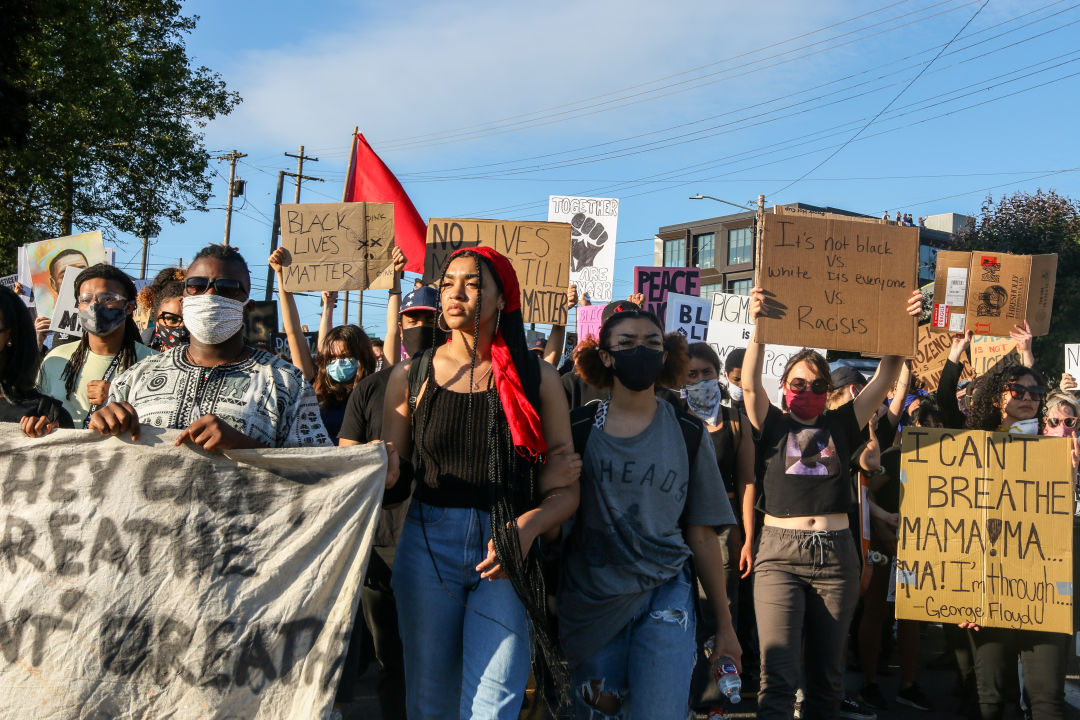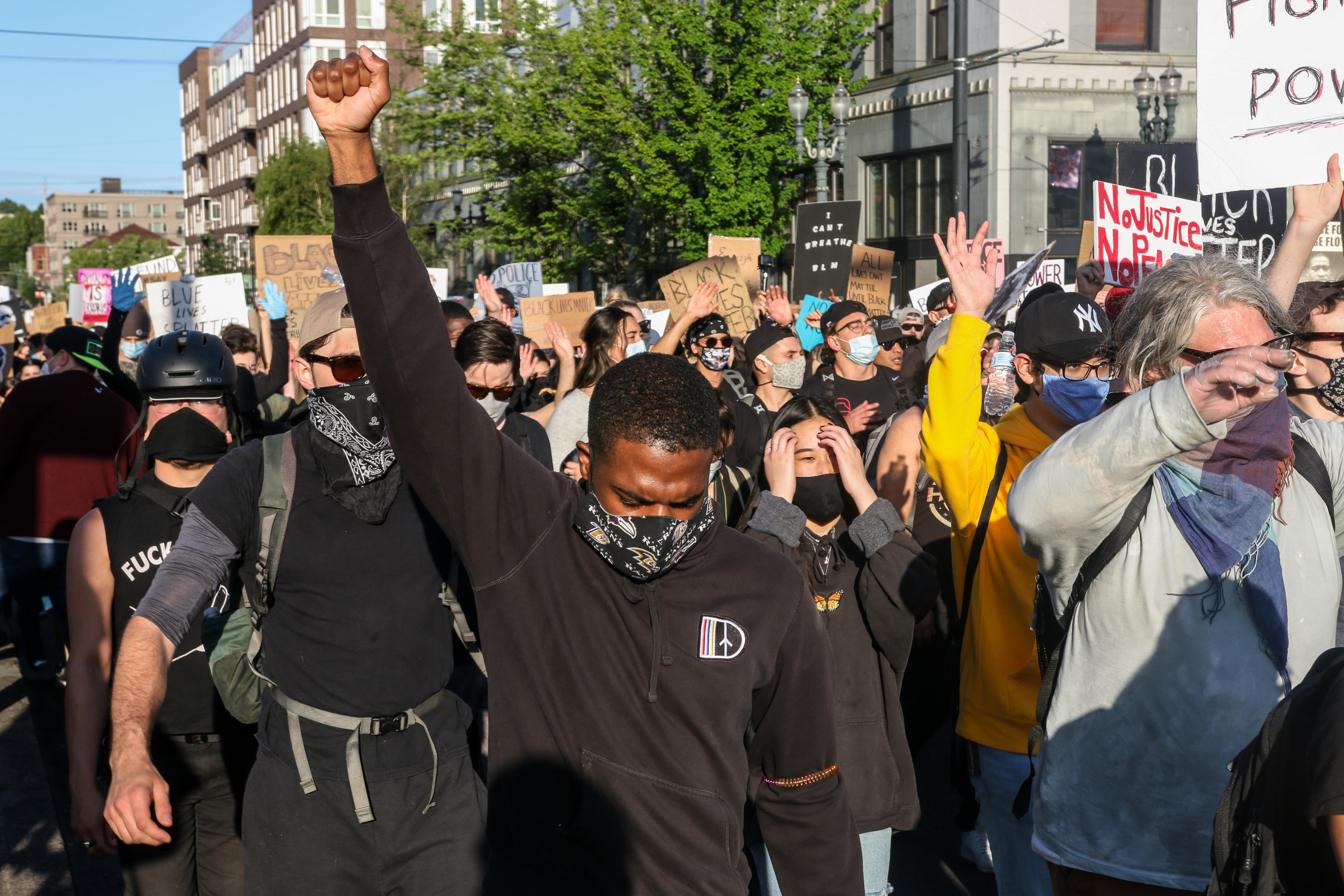Protesters in Portland Want Radical Action but Elected Officials Aren’t Quite There

Portlanders continue to protest against police violence and racial injustice. The effort demands changes in systemic policies that have disproportionately affected people of color.
Image: Gabriel Granillo
The protest movement that has exploded in Portland over the past week is diffuse and diverse, with no single leader, no chain of command, and no operations center. And yet, as the days roll by, a concrete list of shared demands and values is emerging among those who have taken to the streets to march, to lie down, to chant, and to show up for change.
They want to defund the police, or at the very least, transform the current operation from the ground up. They want significant divestment from policing initiatives—from equipment to jail operations to sweeps of homeless camps—directing the money instead toward homelessness relief and mental health services.
And they want immediate changes to law enforcement tactics, from a citywide ban on choke holds, strangleholds, and shooting at moving vehicles to a requirement that police exhaust all other options before moving to force.
“The current police system needs to be abolished,” says Alex, one of thousands at Wednesday night’s demonstration, who came to the protest with his mother and declined to give his last name for fear of persecution by police. “It is a system founded in racism, founded in slavery. It is a system that isn’t broken but is designed to oppress, and needs to be replaced. We”re not going to fix it with new training. We’re going to fix it by replacing what we have now.”
Against that backdrop, elected officials around the city and state are rolling out their own action items, which are, by and large, significantly less revolutionary and more incremental than the wholesale dismantling of the police system called for by many protesters.
The People of Color Caucus in the Oregon Legislature—all Democrats, and all from the Willamette Valley—say they'll focus on a handful of specific goals in any upcoming special session and during the 2021 Legislature, including:
- Transferring responsibility for investigation and any subsequent prosecution of any cases of death of or serious physical injury to a civilian caused by a police officer to the Oregon attorney general’s office.
- Creation of a new, bipartisan group to recommend changes to Oregon’s laws on the use of physical force, deadly or otherwise, when police are making an arrest or preventing an escape. Oregon’s most recent update on this topic came in 2009, which required counties to get state approval for “use of deadly force” plans.
- Prohibiting arbitrators from easing disciplinary action against law enforcement officers if it is found that the officer has committed misconduct.
Portland City Commissioners Jo Ann Hardesty and Chloe Eudaly are calling for an immediate ban on the use of tear gas by the police, given how much is unknown about respiratory effects from such chemicals and the spread of coronavirus.
7/ We have an obligation to find out the impact of those chemical weapons on protesters, especially at the height of a pandemic. I am calling for the city to ban the police use of tear gas immediately.
—Commissioner Jo Ann Hardesty (@JoAnnPDX) June 3, 2020
I am also moving forward policy to take real action now.
She also asked her colleagues to vote to defund the Portland Police Bureau’s gun violence reduction team, school resource officers, and transit police, and to increase training for police officers across the board, so that “everyone who encounters a police officer does not have to be in fear that they won’t make it home that night to their family.”
UPDATES: Hardesty’s demands on school resource officers were heard; Mayor Ted Wheeler announced that he was pulling funding for the school resource officers who had been stationed at Portland’s nine high schools. He also issued a statement June 6 that stopped short of a ban on the use of tear gas by police, saying instead: “Today, I directed Portland Police Chief Jami Resch that gas should not be used unless there is a serious and immediate threat to life safety, and there is no other viable alternative for dispersal. I strongly believe that gas should not be used to disperse crowds of nonviolent protesters or for general crowd management purposes. It should only be used in response to violence that threatens life safety.” Resch resigned two days later.
On June 9, in a Zoom press conference that included Resch’s replacement as police chief, Chuck Lovell, Wheeler announced the elimination of the Gun Violence Reduction Team and the transit unit (once the city’s intergovernmental agreement with TriMet expires at the end of the year), as well as the redirection of $7 million from the police bureau and $5 million from elsewhere in the city’s budget to invest in communities of color; a ban on choke holds; and reform of the use of consent searches in traffic stops.
“I am hearing loudly and clearly from demonstrators that they want fundamental reform,” Wheeler said. When asked if some of that fundamental reform might include his resignation (in which case the successor would be the president of the city council, a rotating position currently held by Hardesty), Wheeler said he had no such intentions: “I believe that I am the right person to lead this city through this period of reform. I have committed to it, and no, I will not resign.”




